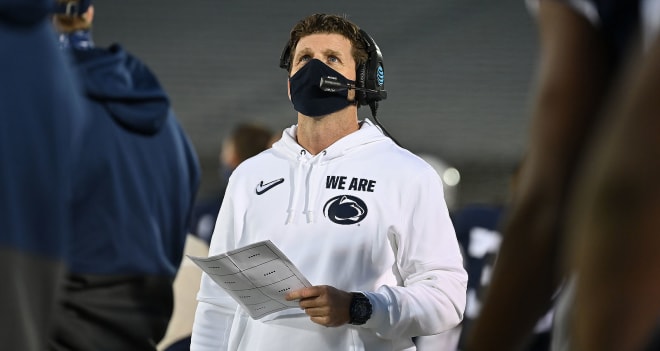Landing within framework, Penn State's defense takes next steps
Penn State’s defensive players have been alluding to it throughout the start of their disastrous 2020 season, if not coming right out and saying it.
The concept?
Playing within the framework of the defense. That, of course, was what the Nittany Lions were prescribing for themselves to see an improvement on their initial performances.
Conversely, the source of so many of their problems en route to an 0-5 mark by late-November had to do with the reality that they were, in fact, very much playing outside the framework of the defense.
Take Jayson Oweh’s comments, for instance, immediately after the Nittany Lions’ 30-23 loss at Nebraska in the fourth week of the season.
“Trust, that's a big part of our defense,” Oweh said. “They've shown that they've won Big Ten Championships with it, they've won a lot of big games with the defense being stout. We can't just try to quit on the defense just because we're losing. It's on the players. We got to be more focused, buy-in, and trust the system because it has shown it works.”
Not a Subscriber? Join us With Our FREE 30-Day Premium Trial

Though they would suffer another setback in the interim, beginning with a 27-17 win at Michigan two weeks ago, followed by last weekend’s 23-7 win at Rutgers, the Nittany Lion defense has made visible signs of progress.
Limiting the Wolverines to 286 yards of offense, Penn State’s defense allowed only six chunk plays, the most damaging in the form of Hassan Haskins’ 59-yard carry. The fewest explosive plays allowed since the opener at Indiana, the Lions followed it with a stifling performance in Piscataway that limited the Scarlet Knights to just 205 yards of total offense, 12 first downs, a 3 of 15 rate on third downs, and, again, only seven explosive plays with none exceeding 20 yards.
Meeting with the media Thursday for the first time since a preseason availability, Penn State defensive coordinator Brent Pry offered his diagnosis of what changed. A process of learning, trusting, and buying-into playing within the framework of the defense, the struggles at the start of the season included a variety of issues compounded by one another.
“Things aren't going well. You want to make a play. You feel like you can,” Pry said. “We talk about guys playing to their instincts, and I want them to do that, but you've got to play in the framework. You've got to do what we asked you to do, what the defense calls for, for the first three, four steps. And then I'm good with instincts taking over and patching out of the gap, or changing the approach, or redirecting. But we were making our mind up ahead of time.
“So much of defense is reading your keys at every position. And when you're trying to see other things and not reading your keys, your keys will take you to your work, and then the plays will come. And for a lot of guys, they wanted to see where or how they could make a play rather than let their key put them in the right spot.”
Behind at the half of each of the first five games, much like the struggles that came to fruition for an offense looking to create something out of nothing, particularly at quarterback, the defense fell victim to its impatience at times.
Rejecting the notion that players were working on their own to pad stats, Pry acknowledged the potential for a “little bit” of mistrust between teammates or the scheme. Suffering the consequences of those tendencies, Pry painted a picture of a defense unable to find the footing necessary to success.
“I had several conversations, guys felt a lot of pressure to make more plays, and you don't do that by jumping out of your gap or changing your technique,” he said. “I think they've settled back down and again, I think you see some things happen that you correct in spring ball, that you correct in camp, things that you fix.”
And those fixes, Pry continued, at least partially were a mistake of his responsibility.
“To be honest, I did a poor job. I should have scaled things back earlier,” he said. “Without having spring and having an insufficient camp, I should have scaled things back. We were trying to do too much, which compounded the issue. There's no doubt in my mind when we scaled things back, we started to see improvement, coupled with the guys' approach and getting back to basics and fundamentals.”
Wrapping up the regular season Saturday afternoon against Michigan State team rated among the least efficient and productive offenses in college football this season, it’s an opportunity from which the Lions’ development can continue within a framework now understood and embraced.
*******
Not a Subscriber? Join us With Our FREE 30-Day Premium Trial
• Talk about this article inside The Lions Den
• Watch our videos and subscribe to our YouTube channel
• Learn more about our print and digital publication, Blue-White Illustrated
• Follow us on Twitter: @BWIonRivals, @NateBauerBWI, @RivalsSnyder, @DavidEckert98
• Like us on Facebook
